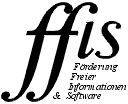
| Menu | |||||
|
|||||

| Oldenburg Linux Developers Meeting 2004 |
The following list is only a small excerpt of what has really happened at this year's developers meeting since so much development takes place that you have to miss some issues.
Alpha architecture
Support for the Turbochannel DEC Alpha 3000/300 has been pushed a lot. Linux 2.4 now boots up to the serial console. However, debugging the ethernet driver seems to have overwritten an EEPROM accidently and the machine stopped booting anymore. Peter still gets into the SRM firmware, so not everything may be lost.
MIPS architecture
When the meeting started several developers began to fix Linux 2.6 for use on 64bit MIPS machines. This lasted a couple of days before the kernel booted up properly. This includes the SGI Indigo2, although R10k userland support is still to be done. Hence, it'll take a while until these machines will run GNU/Linux properly.
Support for the SGI O2 was sufficiently pushed forward, even though the machine was originally said to be unsupportable. The trick was said to be some binary Python distribution for Irix that had stubs to the hardware included. The machine now boots a Linux kernel and can run userland as well. Not all parts of the hardware are supported yet, and there is zero documentation available.
There has been a lot of talk about a new MIPS ABI which was the reason a developer from MIPS UK attended the meeting as well. MIPS want the new CPUs to contain some sort of hardware support for threading which should be reflected in the application binary interface (ABI) as well. This, of course, affects the software side and has the potential to break backwards compatibility. They were interested in gathering developers opinions about this.
Support for delo, the DECstation loader has also been improved for all architectures so the package can be built on all architectures. The dz11 serial driver for the DECstation 5000/200 has also been rewritten, so that this machine can run a local console again.
VAX architecture
A lot of work for the VAX port has been done this year again. Three more VAXstaions or so have also been added to the cluster. One problem of the VAX port is that the VAX binary output in GCC has been subject to bitrot for a while. That's why the porters are working with the older 2.95 version which has rudimentary VAX support. During the meeting GCC and uClib were fixed to be self-hosting and can generate new kernel and userspace programs again. For example bash compiles and runs fine.
CPU detection for VAXstations has been rewritten. The port to VAXstation 4000m90 (KA49) has been started during this meeting. The port to VXT2000+ (an X terminal originally) has been improved, but still doesn't run. More machines and developers are helpful.
On the VAXstation 3100m38 (KA42) problems have been experienced with the LANCE network chip. The problem was analysed and Linux suffers from the same problem as NetBSD. A partial address decoder makes DMA impossible with more than 16 MB of RAM.
Miscelanneous architectures
The Linux kernel contains several serial drivers for the Zilog Z8530 chip family, since such chips are used in several different incarnations in many workstations to drive the serial port. Ladis started to unify the different drivers so that the kernel gets a bit tidied up. The kernel has also received various small fixes on several locations and architectures.
Debian Installer work
The Debian installer people have done a lot of work on the installer and tested it on various architectures that were available from the Linux development. This is actually one advantage for the installer people to piggyback their work camp with the Linux developers meeting. A lot of different hardware is available.
Anton has done a lot of partman stuff. Colin worked on floppies for the
PowerPC architecture. Frans fixed the countrychooser and the
installation manual. Jeff worked on the build system itself. Konstantinos
fixed the localisation configuration and worked on termwrap. Karsten and
myself were working on supporting the LK201 keyboard for DECstation.
Joey reported that rather than focusing on any single problem, he's been floating between a dozen different areas of d-i work, mostly working with the people who are themselves expert or very interested in that area. He also reported how much more work seems to get done in Oldenburg than at other meetings, and this year has just borne that out again.